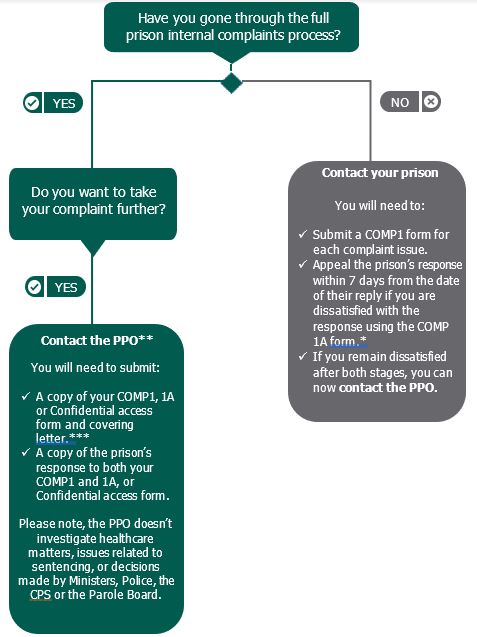This article first featured in Inside Time’s December newspaper: https://insidetime.org/why-dont-women-complain/
I am an Assessment Officer at the Prisons and Probation Ombudsman, known as the PPO. The PPO carries out independent investigations into complaints and deaths in custody. I am part of a team that receives your complaints and decides whether the PPO can investigate them.
This article is primarily aimed at women who are in prison. Women who are in prison complain less often to the PPO than men and so over the past year we have actively been campaigning to make our work better known to women.
By the time you read this, the PPO will have visited ALL of the public sector women’s prisons in England this year. We held informal conversations with groups of women prisoners to explain what the PPO does, find out what their experiences of making complaints are and why they do not tend to use the PPO. In general, the women shared some very honest and frank examples with us. We are now creating a plan to try to ensure that we learn from the women’s experiences and we will share the ideas with you in a future article.
I am in a unique position of being able to say that I am one of the first ex-prisoners employed by the PPO. I have been where you are. I served two and a half years in prison, so I really do know what it feels like to be in your shoes and to encounter problems whilst in prison where you feel that no one and nothing is helping to resolve a particular problem. Prison can be a very difficult time, particularly for women I think. Any problem that you have in prison, even small, can become huge and occupy all your waking thoughts and this is where the PPO really can help.
Now that I work for the PPO, I can see first-hand how we can help you to overcome what might seem like a problem that cannot be solved by the prison itself. I would like to use this opportunity to show you how the PPO can assist you if you have problems that the internal prison complaints procedure has not been able to resolve for you. Along with this article is a diagram of how to make a complaint. It is important that you follow the procedure set out in the diagram – you must submit the COMP forms to the prison first and have received, or waited 30 days, for a reply before you approach the PPO, or we cannot assist you.

*If your complaint is about a sensitive matter such as staff behaviour, you can submit a Confidential access form (COMP 2), which, unlike the COMP1 and 1A, you don’t need to appeal before you can write to the PPO.
** You must write to the PPO within three months of the date of the prison’s final reply.
*** Your cover letter must clearly explain the reasons you remain dissatisfied with the responses you have received.
I know this can lead to more distress when you receive a rejection letter from us so that is why it is important you follow the correct internal complaints procedure. On a daily basis, I receive long letters from prisoners setting out some very serious problems, but if the full process has not been followed then the PPO cannot help.
Take the time to submit a complaint in the correct way and if it fails or you are not happy with the prison’s response then send it to us and we WILL do all we can to help.
Prisoners are often worried that by sending complaints to the PPO, prison staff will be upset with them or that you will get into trouble with your prison if you escalate a complaint to the PPO. On the contrary, you won’t get into trouble and all prisons in England and Wales are used to our input and welcome an objective and independent investigation. Write to us at the following address and look out for our complaints posters and leaflets for more information.
Prisons and Probation Ombudsman
3rd Floor
10 South Colonnade
London
E14 4PU
Frankie – Assessment Officer
